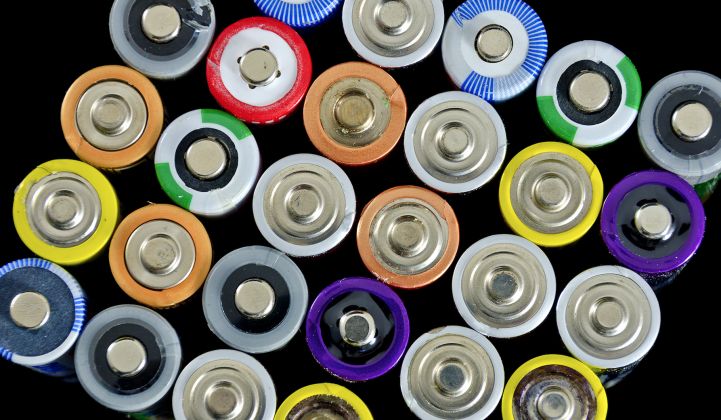Battery maker Varta and the Fraunhofer Institute are taking advantage of a new German government finance package for battery development.
The two organizations this month announced a research partnership days after Germany’s Economy Minister Peter Altmaier unveiled a €1 billion (USD $1.1 billion) fund for battery cell development.
Altmaier said the money was aimed at helping Europe secure 30 percent of global battery cell production by 2030. The European Commission believes the worldwide battery market could be worth €250 billion ($286 billion) a year by 2025, Reuters reported.
Germany wants a significant portion of the market. The money being put forward by the government would help German battery manufacturing consortia get production lines up and running from 2021 onward, said Altmaier.
The government is expecting multiple consortia to take advantage of the cash and hopes each one will create between 1,000 and 2,000 jobs. Altmaier said he expects consortia to start making investment decisions from the first quarter of next year.
The partnership between Varta and Fraunhofer Institute is the first to come forward.
Varta will be looking to Fraunhofer to help diversify its battery portfolio, which currently specializes in batteries for hearing aids and large storage systems for solar energy, to include lithium-ion cells for electric cars.
The focus of research will be to set up a digitized production line that will reduce a current battery scrap rate of 10 percent, Reuters said.
The chemical giant BASF and Ford’s German subsidiary Ford-Werke are also in talks with the German government about building local battery cell alliances. Volkswagen is also said to be open to joining a Berlin-led consortium exploring production of electric car battery cells in Germany.
While the German government’s spending on batteries appears to have galvanized the sector, there are concerns the investment is now too little, too late.
“Battery cells are at the heart of electric vehicles,” said Mitalee Gupta, an energy storage analyst with Wood Mackenzie Power & Renewables. “Currently all major German automakers have supply contracts with Chinese, Korean and Japanese battery vendors."
Volkswagen, for example, has battery supply contracts with LG Chem, Samsung SDI, SK Innovation and Contemporary Amperex Technology (CATL), she said. And most of these Asian vendors are already developing manufacturing bases in Europe.
“The fear of losing out to Asian battery vendors is becoming real as the EV industry takes off, and hence this strategic investment will help German automakers strengthen their supply chains,” Gupta observed.
However, the amount put aside by Germany for its entire national battery industry building effort is barely what each of Asia’s Tier 1 manufacturing giants are spending.
LG Chem, for instance, earlier this year announced a $1.8 billion investment for a plant in China that is expected to have an output of 32 gigawatt-hours of battery capacity a year by 2023.
Also this year, BYD announced a $1.5 billion spend on its biggest EV battery plant in China, scheduled to have 35 gigawatt-hours of production capacity.
CATL, meanwhile, is planning to invest around €240 million ($280 million) in an EV battery plant in Europe with 14 gigawatt-hours of capacity by 2022. The plant, in eastern Germany, will supply batteries for BMW.
The German carmaker plans to source €4 billion ($4.7 billion) of battery cells from CATL over the next few years, reported Reuters. The CATL investment, announced in July, is thought to have stung German Chancellor Angela Merkel. “If we could do it ourselves then I would not be upset,” she said.
Across Europe as a whole, battery-making capacity is set to grow by 20 times in the next seven years, hitting 90 gigawatt-hours of manufacturing output per year by 2025, based on figures from Wood Mackenzie Power & Renewables.
Nevertheless, said Gupta, Asia’s significant head start in battery manufacturing would make it a hard rival to beat. “It is obvious that Germany is making big strides to build their own battery supply chain,” she said.
“But in comparison to the investments that are going into China, a lot more will be needed to develop strong European manufacturing.”
--
Now in its fourth year, GTM's Energy Storage Summit will bring together utilities, financiers, regulators, technology innovators, and storage practitioners for two full days of data-intensive presentations, analyst-led panel sessions with industry leaders, and extensive, high-level networking. This year, we're expanding our traditional U.S. event to cover the global market. Learn more here.




